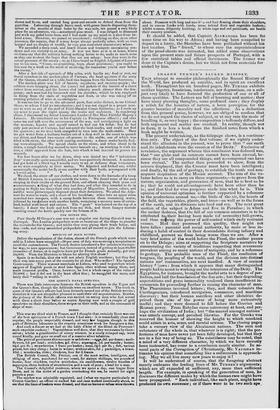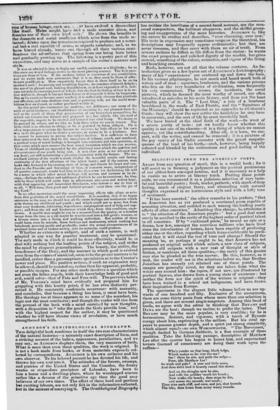SHARON TURNER'S SACRED HISTORY.
THIS attempt to consider philosophically the Sacred History of the World, has produced an amiable, and in spirit an excellent book. Throughout his six hundred pages, Mr. Teasisa exhibits neither bigotry, fanaticism, intolerance, nor dogmatism, on a sub- ject very likely to have fostered the production of one or all of these qualities. The Letters are full of learning and matter; they have many pleasing thoughts, some profound ones ; they display a relish for the beauties of nature, a keen perception for. the greater beauties of morality and the affections. As a deduction from this general praise, however, we are obliged to confess that we do not regard the choice of subject, or at any rate the mode of handling it, as very happy ; the composition is tediously diffuse, and both argument and matter are overlaid. In reality, though not in form, it is less a book than the finished notes from which a book might be written.
The present undertaking, as the titlepage shows, is a continua-
tion only. The object of the first volume, if we rightly under- stand the allusions in the present, was to prove that " our earth and its inhabitants were the creation of the Deity." Exclusive of revelation, the argument whence this conclusion was deduced was, that " our globe and its contents cannot have been eternal, be- cause they are all compounded things, and no compound can have been eternal." The author then proceeded to show, from the science displayed, that the Creator must have been intelligent ; and finally, by the aid of geology, to establish the truth and con- sequent inspiration of the Mosaic account. The aim of the vo- lume before us is to carry on these arguments,—to prove from the nature, organization, and generation of man, that he is best as he is; that he could not advantageously have been other than he is ; and that God for wise purposes made him what he is. This opinion of universal optimism is further supported by a reference to the productions around us,—the birds of the air, the beasts of the field, the vegetables, plants, and trees—as well as to the forms of the earth, and its divisions into land and sea. The next great section of the subject is Adam and Eve in Paradise; in which the author deduces, that the fall of our common ancestors is to be attributed to their having been made (of necessity) full-grown, and thus milsing the power of self-control which early restraint causes. Had they possessed this quality, they might not have fallen : parental and social authority, by more or less in- ducing a habit of control in their descendants during infancy and childhood, prevent us from being worse than we are. After a very brief notice of the world before the Flood, the author passes on to the Deluge; aims at supporting the Scripture narrative by enumerating the variety of traditions respecting that occurrence prevalent among so many nations of antiquity, and by a reference to geology. The probable uses of the Flood, the confusion of tongues, the peopling of the world, and the division into distinct nations an". communities, are next handled. A view of ancient history Vaows : from which it appears that many distinguished people had to assist in working out the intentions of the Deity. The Egyptians, for instance, brought the useful arts to a degree of per- fection, and laid the foundation of the fine arts; but their degrading superstitions and gross immorality rendered them insufficient in- struments for proceeding further in raising the character of man. The Phoenicians invented letters ; they, and their colonists the Carthagenians, introduced navigation, commerce, and maritime discovery; but their human sacrifices and other idolatries de- prived them also of the power of being more extensively useful ; and they were doomed to fall before the Grecian and -Roman power. From Babylon came astronomy at least, and per-
haps the civilization of India ; but "the marvel amongst nations" was utterly corrupt, and perished likewise. For the Greeks was reserved the honour of showing the height to which mankind could attain in arts, arms, and mental science. The closing pages take a cursory view of the Abrahamic nations. The sum and substance of the whole is, that whatever is is right; that the per- fections of man have never yet been fully developed, but that they
are in a fair way of being so. The coincidence may he noted, that a mind of a very different character, by which we have recently been instructed, has come to a conclusion nearly similar. In se- veral parts of the Corruption of Christianity, Mr. VAUGHAN in- timates his opinion that something like a millennium is approach- ing. May we all live many new years to enjoy it !
It will be understood of course, that the foregoing abstract
merely embraces the leading lines of Mr. TURNER'S arguments; which are all expanded at sufficient, nay, more than sufficient length. For example, in speaking of the generation of man, he discusses the different modes by which the human race might have been propagated. "Each individual, like each plant, might have produced its own successor; or if there were to be two such ape. 'cies of human beings, ea eit se s . Et t have evolved a desceodant like itself. Males might 'lave hall a mule ancestor alone, and females one of their own kit4 only." Ile shows the benefits in the domestic and social eetsktis ion which arise from the mode se- lected; dilates upon tIoprescience required to produce not a nomi- nal but * real eritialit!, it sexes, as regards numbers; and, as we have hinted already, traces out through all their varioue rami- fications the advaetaees that spring from our being born babes aR(1 gradually groaving up. The following is a pretty part of this 'exposition, and may serve as a sample of the writer's manner and sttyle. it was an edvolrahle idea to begin our eat thly existence as a filial babe; for in Ibis state our saoral feelings evolve in the most pleasing manner. The first vim- Cons are thuse.of love. If the sucking Miami is conscious of any sensibilities, and its sweet smile soon announces that it is so, they must be those of Alice- 'donate gtatitcati( n. How exquisitely happy does it show itself to be on its mother's Heck ! Its moving and moulding fingers; its murmur of•placid delight ; the eye of its pleased soul, looking thankfulness., or at least expressive of it, indi- cate not only its own enjoyment as it feeds. but also that the feeling of love is in ac- tion within it, though it has not then learnt to distinguish it from its happiness. Bat twits emotions become more 'looked, it is sufficiently obvious that gratitude and affection, and soon obedient duty and asquieseing will, are the moral sensi- bilities first awakened, or rather produeed within it.
At this period also commence our modesty, our diffidence; our sense of the need of social kindness; our thankfulness on receiving it ; our pleasure from it ;
and as the result of these, that germination of our benevolent sympathies, for -Which our Creator has formed and prepared us ; but which, like the teed of the vegetable, require to be excited and fostered into vital being. We desire to
be assisted by others, and we like to help them when we can in return. The
little dal is as officious to oblige, as he is gratified by being obliged. Ile is often importunate to return the favours lie reeeives, by little efforts in his own -way to do the giver what he thinks a service, or means to be a kindness. But
it cannot be necessary to pursue the subject further. It is sufficient to have thus intiirated the fact, that by the succession of infancy, youth, and manhood, a gradual train of moral feelings is brought into existence and into operation, in that series which most secutes the best moral formation which we can receive. Those of childhood are succeeded by the addititnial ones which the position and
circumstances of our youth bring out. A new class arise as we advance into rea.lood, yet still maintaining a pleasing connexion with the former. The un- civilized nations of the world warmly display the beautiful results and lasting continuity of the find affections of the lucent heart ; and if the mature man looks duly forward to his ensuing state of being, and directs his heart and con- duct to the Provider and Sovereign of that, as common sense, independent of
all positive command, would lead him to do, then even his declinining life will
be a scene in which other moral feelings will accrue, and increase as he de- cays,—feelings the noblest and sublituest of which he can be conscious ; for they,
will be those which will unite him in affectionate adoration and ardent hope, with that approving and benevolent Benefactor, who desires te say to him as to all, '4 Well done, thou good and faithful servaut ! enter thou into the joy of thy Lord."
In no other succession could the same improving effects take place, as arise from this gradation of the moral sensibilities. It is manifest, that if we began
existence as the man, we should lose all the sweet feelings and sentiments which
arise during our childhood and youth ; and which could' not so arise, but from their very weakness, inferiority, dependence, and perpetual need of help and sups
port; and from the aid and kindnesses which they, from this condition, expe- rience. A marble man might be cut in a moment from the quarry, or a wooden image from the tree, as a cat might be transformed into a full-grown. woman, or • bronze statue into a living and walking individual. But neither of these could have, even by miracle, those feelings and sentiments, which nothing but babyhood, growing gently and gradually, under the actual circumstances of its parental home and of human society, into its maturity, could produce. Whether so extensive a subject, and of such a nature, is well adapted in any way for popular treatment, may be questioned.
The only mode in which it could be done effectively, would be to deal with nothing but the leading points of the subject, and strike the mind by eloquent generalization. The beauty, the utility, the beneficence of the Deity, and the manner in which good is evolved even from the crimes of mankind, seem to be the proper matters to be handled, rather than a presumptuous speculation as to the Creator's power and plans: His positive actions, if such an expression may be allowed, should be insisted on, rather than his apparent, probable, or possible designs. For any other mode involves a question which not even the fallen angels, with their knowledge both of good and evil, could solve—that of Fate and Free-will. The previous habits of Mr. TURNER'S mind have evidently not prepared him for grappling with this knotty point, it' he has even distinctly .per- ceived it. He constantly confounds occurrence with necessity, and concludes, that because a thing has been, it must have been. His theology too at times appears to us none of the soundest, his logic not the most conclusive; and though the reader will rise from the perusal of the book with a mind enriched by new thoughts, with a disposition to" take the goods the Gods provide him," and with the highest respect for the author, it may be questioned whether he will have clearer views of revelation, or have much strengthened his faith.

















 Previous page
Previous page